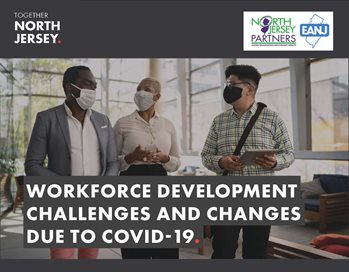 Employers will have to be flexible, provide a positive workplace culture and potentially allow for teleworking if they want to attract and retain employees, according to a panel of experts.
Employers will have to be flexible, provide a positive workplace culture and potentially allow for teleworking if they want to attract and retain employees, according to a panel of experts.
Representatives from workforce development boards, small businesses and the Employers Association of New Jersey (EANJ) offered their perspectives on the impact the COVID-19 pandemic has had on employment during the latest Together North Jersey Institute event, Post-Pandemic Workforce Development Challenges and Changes. North Jersey Partners, a collaborative of workforce Investment boards in Bergen, Essex, Hudson, Morris, Sussex, Warren, Passaic and Union counties, co-hosted the event.
John Sarno, president of EANJ, said businesses are still struggling to fill minimum wage positions, but there are lessons to be learned from the pandemic. His organization is comprised of more than 3,200 employers throughout the state, ranging from small family-owned businesses to large corporations. He said 80 percent of EANJ members had to cut wages, furlough or layoff staff during the pandemic. Now that things are reopening, it has been hard to fill vacancies.
“As we meet today, we have more job vacancies than we have people looking for work and we have people quitting jobs at a 20-year high, particularly those people who have options,” he said citing national employment statistics.
He said workers faced additional stress and mental health issues related to the pandemic. How employers responded to that made a difference. He said workers who had options quit and took positions at businesses that were employee-centric and offered a culture of caring.
“I think the bad employers got worse, but the good employers got better and now we have an opportunity to learn from those good employers,” he said.
While the pandemic presented multiple challenges, small businesses said it also allowed them to embrace technology and find new ways to continue their work.
Elizabeth Gloeggler, CEO of Literacy Volunteers, said her non-profit had never provided virtual reading and writing instruction. However, since March 16, 2020, they have served 1,519 clients virtually and didn’t have to layoff staff. The organization employs 21 people in offices throughout the state.
While Gloeggler said it was a challenge teaching clients how to use the devices they had available to them — whether that was a cell phone, tablet or computer — and how to connect to resources, the pandemic also removed physical barriers. For the first time, staff at all locations were able to meet and conduct training together remotely.
Penny Muccia, dean of Parisian Beauty Academy, shared a similar experience. The school had never offered virtual instruction but had to quickly shift to that. Figuring out how to teach a hands-on trade virtually was a challenge, but she said being part of the larger Paul Mitchell Partner Schools, which has 114 other schools, helped them problem solve and develop curriculum.
For the first time the school was able to host virtual tours for interested high school students and their parents and they also held job fairs to connect students with potential employers. She said the technology was a “game changer.”
Jane Armstrong, executive director of the Morris-Sussex-Warren Workforce Development Board and an officer of North Jersey Partners, and Miriam Salerno, who manages research for Rutgers’ Public Outreach and Engagement Team, presented the findings of a research study, Understanding the Workforce Development Needs of Small and Mid-Sized New Jersey Employers, which began prior to the pandemic and had to pivot when businesses were hit by COVID-19 restrictions.
The research found there was a need for assistance and support with workforce training.
Armstrong said many businesses were unaware of the resources available to them and suggested that a portal listing all the resources in one place would help them recover from COVID-19 and also succeed in the future.
Armstrong said the surveys and focus groups also highlighted ways employers can work to retain and attract staff, including focusing on outcome-based work, rather than requiring employees to work set time periods. Salerno said this could also help provide flexibility to workers who need to care for children or older adults at home and who are struggling to balance both.
Tammy Molinelli, chair of North Jersey Partners and executive director of the Bergen County Workforce Development Board, said workplace culture and morale were areas of concern prior to the pandemic, but COVID-19 only elevated these issues.
She said companies that embrace technology and a hybrid workforce, which allows for remote work, can improve employee engagement, operate more efficiently, and increase collaboration.
“Companies that we anticipate doing well are those organizations that look at human resources and look at their human capital as an asset,” she said. Molinelli said these companies will be “able to look at people, understand how they work, what their abilities are, and engage those people in the business to move the company forward.”